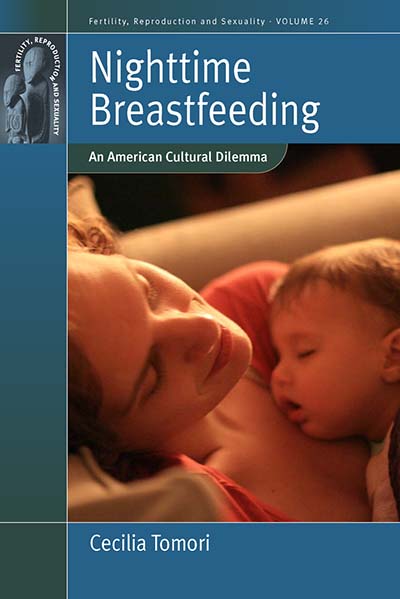by Cecília Tomori
For World Breastfeeding Week, we’re delighted to offer FREE access to a chapter from Nighttime Breastfeeding for a limited time. Click here to access this chapter, titled Embodied Cultural Dilemmas: An Anthropological Approach to the Study of Nighttime Breastfeeding and Sleep.
Nighttime Breastfeeding addresses the central question: why do so many American parents struggle with nighttime breastfeeding and sleep? I set out to answer this question, which emerged from my preliminary fieldwork, using the classic anthropological technique of participant observation. I spent many months immersed in fieldwork, and then many more surrounded by all the materials I had collected – piles of fieldnotes to interview recordings, brochures, photos, and, most importantly, memories of being with families who have graciously let me into their lives. I revisited key moments over and over again – recalling certain phrases, pauses, and gestures, which I could examine through the lenses offered by my anthropological training.
A key challenge in this process was “to make the familiar strange” – to raise questions about assumptions that are taken for granted. Although I grew up in Hungary, and thus many aspects of how to raise a baby in the U.S. were quite new to me – I had to continually question the assumptions that I learned throughout my fieldwork. The book was built from this ethnographic ground up, weaving together interactions with participants in my study with multiple analytical frames drawn from the work of biological and sociocultural anthropologists, historians, and feminist scholars.
In the book I show that the nighttime struggles over breastfeeding and sleep are hardly a given. Mothers around the world in diverse cultures breastfeed and sleep next to their infants without major concern or controversy. Indeed, breastfeeding and proximate sleep are not simply human practices, but reflect our shared mammalian evolutionary history – adaptations that ensured and continue to ensure the survival of mammal infants. Solitary sleep and replacement feeding with infant formulas are very recent historical innovations with culturally specific origins. Instead of simply accepting the voluminous parenting advice literature that assumes that nighttime breastfeeding must be quickly eliminated and infant sleep must be regulated, my book describes that this concern over nighttime breastfeeding and sleep arises from a process of cultural change and the conflicts that it engenders.
The cultural acceptance of breastfeeding has gone through its ups and downs in the U.S. After decades when breastfeeding was replaced by artificial infant formulas, grass roots activism and public health initiatives propelled a major upsurge in the practice. But breastfeeding is not a fully accepted cultural norm – as those who newly embark on this journey quickly learn. Indeed, while significant progress has been made, there are few structural supports to support breastfeeding, which results in significant breastfeeding disparities and highlights the privileges necessary to overcome obstacles to breastfeeding. These problems are compounded by the cultural stigma associated with breastfeeding due to its association with sexuality. In contrast to breastfeeding, the innovation of solitary infant sleep, which became common alongside formula feeding, has remained the dominant cultural ideal. In fact, the notion that babies should be put to sleep without nursing, and sleep through the night (ideally in a separate room within weeks after birth) gained further traction due to medical interest in sleep that took solitary infant sleep as the norm while labeling bedsharing sleep as dangerous regardless of its context.
Consequently, new parents are launched into a conflicted cultural and moral terrain. On the one hand, there is growing cultural pressure to breastfeed. On the other hand, there is little cultural knowledge or support for breastfeeding. And, certain aspects of breastfeeding, such as breastfeeding at night, are even less understood or accepted. Bedsharing violates cultural norms and is considered downright dangerous. When parents find that their babies fall asleep while breastfeeding, and wake up when they are put down, they have to confront these dilemmas. Most will bring their babies into bed to breastfeed and sleep next to them because they find it easier – or the only way that they can get rest at all – at least some of the time. But this practice is considered harmful, risky and potentially even deadly. What will parents do? What will this mean for how infants should be raised and relationships between parents and children? What are the consequences of defying cultural norms? The book explores the visceral experiences of these dilemmas and shows how parents confront and negotiate them. I show that through their actual practices, breastfeeding parents renegotiate, and therefore shift, cultural norms – even as they negotiate stigmatization.
Although breastfeeding has recently been incorporated into safe sleep recommendations, which signals change, advice against bedsharing, even in the context of breastfeeding remains intact. The full extent of cultural changes, and any institutional support for them, will only be known with time. I am certain, however, that a comparative anthropological perspective is needed in this debate. Nuanced understanding of human behavior can lay the groundwork for greater acceptance of breastfeeding, including nighttime breastfeeding, and for more equitable and appropriate support for all families throughout their breastfeeding journeys.
Cecília Tomori is a medical anthropologist who has worked as a health services researcher at Northwestern University’s Feinberg School of Medicine and the Jesse Brown VA Medical Center and is currently a Research Associate at the Johns Hopkins Bloomberg School of Public Health.

